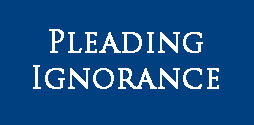Posts Tagged ‘ Qui Tam ’
GOP Whistleblower Site to Keep Tabs on Their Own
January 12th, 2011. By AbiK
Call me jaded. Call me skeptical. Call me “oh, ye of little faith”. But I’m guessing most of you out there will call me a realist when you take into consideration that House Oversight Chairman Darrell Issa (R-CA) is running a whistleblower website (see pic; wb-gop-oversight.house.gov/) whereby government insiders and the general public can blow the whistle on perceived (or real) fraud or misconduct—done by anyone regardless of party affiliation.
By the way, for those who don’t breathe, eat, and live this stuff on a daily basis, when we’re talking government fraud, we’re talking “Qui Tam” whistleblower cases. More on what the heck Qui Tam means can be found here on our blog.
I do commend the effort—Issa’s not only got the website going—it’s a form that you can fill out to report government fraud, and of course, while you are required to submit your email address or phone number, all details provided will be “kept in strict confidence”. But he’s out there socializing it as well in an effort to not only be accessible but seemingly more transparent. Go Rep Issa.
According to a post over at TheHill.com, Issa’s also got a twitter account (@DarrellIssa, and yes we (@OnlineLegalNews) follow him) where he responds to tweets shot over in his direction.
[Note to self: given recent requests (er, subpoenas) for info exchanged on Twitter re: WikiLeaks, maybe not ideal to post sensitive info, questions, allegations, or otherwise on Twitter…]
Interestingly too, the article at TheHill.com also has some comments—one’s from a Daniel Haszard who’s a steady commenter here at LawyersandSettlements.com on Zyprexa. Guess it is true we all run in the same circles… But another, from Back Firer, reads “He just opened the door for more crazy people to take their anger out on govenment. This man is on a witch hunt, but the hunt will back fire.” Well, perhaps, but I do agree there will be quite a number of “vent” submissions, and submissions from crackpots, and I pity the fool who’s going to have to moderate it all.
But—I suppose if it does stop even just one act of fraud, maybe it’s worth it.
Again, I do commend Issa’s efforts—but for my money, give me an attorney who specializes in whistleblower litigation. I so want to trust that the powers that be will do the right thing, with zero repercussions or retaliation, but like I said, call me jaded, I just can’t “go there” yet.
What do you think?
Whistle while you Work? Sad Reality in American Business
November 2nd, 2010. By Hunter West
 Anyone who is aghast at the recent $750 million GlaxoSmithKline (Glaxo) whistleblower judgment to settle manufacturing deficiencies at a former plant in Puerto Rico shouldn’t be surprised that such things are going on. Happens all the time, it seems. And not just to Glaxo, either.
Anyone who is aghast at the recent $750 million GlaxoSmithKline (Glaxo) whistleblower judgment to settle manufacturing deficiencies at a former plant in Puerto Rico shouldn’t be surprised that such things are going on. Happens all the time, it seems. And not just to Glaxo, either.
In actual fact, that $750 million—of which the whistleblower earns a share of the penalty totaling a whopping $96 million—pales in comparison to the $3.1 billion that the US Department of Justice has recovered under the federal False Claims Act so far in just this fiscal year alone.
Last year the haul was almost twice that—$5.6 billion.
Some will say that the whistleblower is an opportunist hoping for a big payday in the end, and will take any amount of criticism and crap en route to the pot at the end of the rainbow. Hell, I’d put up with a lot of grief to collect $96 million.
I would even eat liver.
But to those who view whistleblowers as ambulance chasers, consider the amount of fraud and wrongdoing that serves as a persistent blight on the business landscape. Somebody has to expose such misdeeds—and if the government can’t route out the evil-doers (sorry ‘W’…) on their own, then they have to provide incentive for those who can.
We would all wish that whistleblowers were not necessary. In a perfect world every business and corporate entity would operate with integrity and play by the rules.
Sadly, that’s not the case.
According to Taxpayers Against Fraud, a not-for-profit that supports whistleblower lawsuits, Read the rest of this entry »
Whistleblowers: Are You the Next Erin Brockovich?
December 2nd, 2009. By Kristine B
 Okay, so Erin Brockovich isn’t the only whistleblower in US history. But, thanks to that oh-so-memorable movie, a lot of people consider her to be the most famous whistleblower. Much like the movie about her ordeal showed, the path to becoming a whistleblower is often long, complex and filled with confrontation (including some memorable Oscar-worthy scenes). Many potential whistleblowers may not know all the protections available to them. So, this week Pleading Ignorance looks at complex world of whistleblowers.
Okay, so Erin Brockovich isn’t the only whistleblower in US history. But, thanks to that oh-so-memorable movie, a lot of people consider her to be the most famous whistleblower. Much like the movie about her ordeal showed, the path to becoming a whistleblower is often long, complex and filled with confrontation (including some memorable Oscar-worthy scenes). Many potential whistleblowers may not know all the protections available to them. So, this week Pleading Ignorance looks at complex world of whistleblowers.
What is a Whistleblower?
Aside from the obvious (that’s right, a person who blows a whistle IS—technically—a whistleblower) a whistleblower is a person who reports that an organization of which he is a part of is involved in misconduct. Frequently, the organization is an employer, but it doesn’t have to be. The whistleblower reports the misconduct to a person or entity that has the power to take corrective action against the unethical organization.
In a nutshell: Person A works for Company B, which is involved in illegal activity. Person A reports Company B’s activities to Entity C. Entity C then takes action against Company B for its illegal activity. In some cases, Person A then gets a movie made about her life. (Note: this Read the rest of this entry »
Archive by Category
- Accidents (24)
- Airlines (9)
- Asbestos Mesothelioma (262)
- Automotive (25)
- Celebrity (14)
- Class Action (84)
- Complaints/Comments (15)
- Consumer Fraud (84)
- Contest (2)
- Court of Public Opinion (5)
- Crazy Sh*t Lawyers See (61)
- Criminal Law (4)
- Defective Products (111)
- DePuy ASR Hip Recall (2)
- Discrimination (22)
- Drugs/Medical (248)
- Elder Care Abuse (4)
- Emerging Issues (462)
- Employment (54)
- Environment (52)
- Financial (28)
- Food Illness (15)
- Human/Civil Rights (4)
- Insecurities (5)
- Insurance (16)
- Intellectual Property (16)
- Internet/E-commerce (19)
- lawsuits (161)
- Lawyers (20)
- Lawyers Giving Back (43)
- Lex Levity (10)
- Personal Injury (106)
- Pleading Ignorance (53)
- Real Estate (2)
- Recall (6)
- Scam (3)
- Securities (13)
- Settlement (81)
- Tort Reform (2)
- Totally Tortelicious (81)
- Veterans (11)
- Whistleblower (9)
